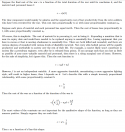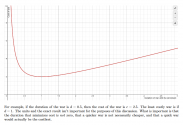I wouldn't speak so categorically. There could be a number of reasons and outcomes for the use of Western armor.
Is not like we haven't seen the Ukranians send equipment right away even if piece meal.
I wouldn't speak so categorically. There could be a number of reasons and outcomes for the use of Western armor.
Ways to deter Western action in PMR:
– A ground operation, a total bombing of one of the cities or strikes on important humanitarian facilities in the West of Ukraine, for example, sanitation facilities, without which life in any city is impossible.
However, such an option is unlikely — a ground operation from Belarus is difficult to implement due to the high resource consumption. At the same time, Kyiv is fully prepared for such a scenario: the Volyn fortified area has long been built for defense.
And the total destruction of Lviv or Lutsk will hardly stop the collective West from using ordinary Ukrainians as a bargaining chip: Ukrainian authorities are completely controlled by decisions from overseas and will continue to do what they are told.
The only possible option is to use tactical nuclear weapons (TNW) to intimidate the enemy by striking an unpopulated area in western Ukraine. Now none of the NATO countries considers the threat of the use of TNW in Ukraine to be serious — they simply stopped fearing a huge deterrent factor.
At the same time, for the West, such a scenario is even beneficial for the further "demonization" of Russia, and an artificial escalation in the PMR can be implemented specifically to force the Russian Federation to such a step.
Now the Russian authorities are at a crossroads in the issue of Transnistria: inaction is likely to ruin the whole region and create huge reputational costs, and a TNW strike can make the country an outcast, but at the same time will save thousands of Russian cicitizens.
According to that Australian mercenary (Ukrainian 24th mechanized infantry brigade IIRC) Willy Oam interviewed, from what he's seen Wagner has actually taken very few losses in their assault.If I were AFU, Bakhmut would probably a good place for an offensive. Against exhausted enemies, once fresh Western assistance arrives, a Bakhmut offensive would be a huge symbolic victory and probably is a place people don't expect a Ukrainian offensive as opposed to the southern Crimean land brige.
Russia is trying to lay siege on Bakhmut for moer than hald a year by now - talk about bleeding the attacker dry. I don't think that an army incapable of taking a 50,000 people town is to be reckoned with when it comes to winning this conflict. For me a Ukrainian victory is more a question of timing than "if".
Baby steps. They've been trying to take Bakhmut for 6 months now and lost 99% of Kharkiv Oblast and western part of Kherson trying to link with their fellow Russians in Moldova is just a wishful task.
I think the idea that cost is proportional to the duration of the war is way too simplistic. To illustrate why, I will create a slightly less simplistic cost model and show how it gives a fundamentally different result. It will involve some equations, and that might confuse some readers, however I think it would be even more confusing if I didn't write any equations. I upload a PDF as images because as far as I know that is the easiest way of writing a post with equations on this forum.Just a quick detour from the normal operation of the thread, given that we are approaching the 1 year mark:
With about 1 year since the war started, I wanted to highlight why they say that war is a disaster for a nation, constantly drawing its wealth.
If we go by averages, and with a simple estimation. Lets say every day in the war it costs Russia $200 million (ammo consumption, ordinance, logistics, maintenance, compensation for dead/wounded etc) for its military needs.
200 × 365 (days in a year). We can say that the first year of this war has likely cost Russia:
$73 billion
Mind you, that's direct costs, not indirect (which could easily be double)
Its not only about spending all that money on war, but also the opportunity cost. Lets say Russia wasn't at war, and wanted to invest $73 billion in its civilian economy and business, imagine how much it would have developed. Now you can see how damaging a war is for a country
This is why, certain famous people (lol), have always said to finish a war quickly. The more time you spend on this, the more your strength will weaken, and the more the opportunity costs you accrue as not the whole planet is at war. Other countries at peace continue to invest in their economies while you have to spend your money for war.


Very nice analysis, with hard to argue logic.You talk about the opportunity cost of the war. Yet before discussing opportunity costs of the war, or declaring this war an disaster for Russia and implying it was a mistake, one must consider what the alternatives were and how costly those would have been. You assume zero cost without the war. Yet what would be the cost to Russia of letting Ukraine mass-produce a very large stockpile of Hrim-2 and Neptune missiles, and then using those to strike Russian infrastructure and Russian commerce in the Azov sea if Russia interferes with Ukrainian attempts to recapture Donbass and Crimea? What would be the cost to Russia of vacating Crimea and Donbass and letting Ukraine join NATO? What increased defense expenditures would that cause for Russia? Consider that those defense expenditures would be incurred every year for eternity.
Interesting analysis. I have to look in more detail. My takeaway is that there's an optimal war length, but also that the marginal cost of the war does not get too much higher afterwards compared to the initial cost even if the war goes quite a bit longer.I think the idea that cost is proportional to the duration of the war is way too simplistic. To illustrate why, I will create a slightly less simplistic cost model and show how it gives a fundamentally different result. It will involve some equations, and that might confuse some readers, however I think it would be even more confusing if I didn't write any equations. I upload a PDF as images because as far as I know that is the easiest way of writing a post with equations on this forum.
View attachment 107816
View attachment 107817
This cost model is of course a huge simplification. The point is just to show how a slightly less simplistic model can give a fundamentally different result than your linear model. One could take into account how the duration of the war might affect enemy behaviour. Another thing that one could take into account is interest, which is another reason to defer war expenditures into the future as much as possible rather than front-load it. Due to the sanctions and cut supply chains, there are a lot of investments that Russia needs to make right now to repair supply chains, and the sooner those investments are made, the sooner they can start yielding returns.
Of course, Putin is a politician, and the currency he cares most about is political capital. There is a political value in spreading out war expenditures over time. He won't lose much in the polls over a 5% cut in social spending. This can be achieved easily by simply printing money and inflating the money supply by about 5%, and most people won't even notice. However a 50% cut will yield immediate protests.
Someone might argue that Russia should be using maneuver magic to decouple l from its dependence on d, so that they can finish the war faster without taking higher losses. Of course, maneuver is great - when it works. I already wrote a lengthy post #4,797 on why I don't think maneuver can work for Russia in Ukraine.
You talk about the opportunity cost of the war. Yet before discussing opportunity costs of the war, or declaring this war an disaster for Russia and implying it was a mistake, one must consider what the alternatives were and how costly those would have been. You assume zero cost without the war. Yet what would be the cost to Russia of letting Ukraine mass-produce a very large stockpile of Hrim-2 and Neptune missiles, and then using those to strike Russian infrastructure and Russian commerce in the Azov sea if Russia interferes with Ukrainian attempts to recapture Donbass and Crimea? What would be the cost to Russia of vacating Crimea and Donbass and letting Ukraine join NATO? What increased defense expenditures would that cause for Russia? Consider that those defense expenditures would be incurred every year for eternity.
